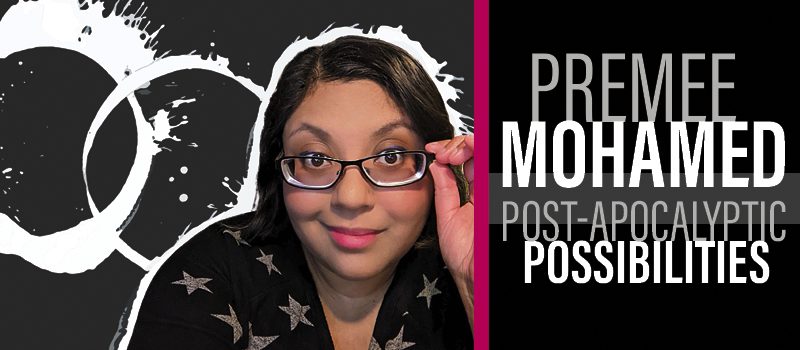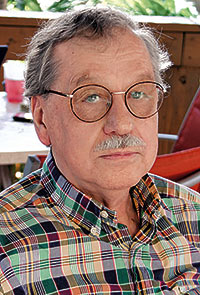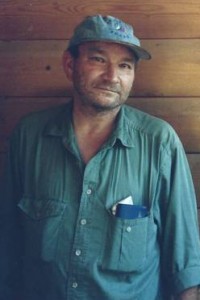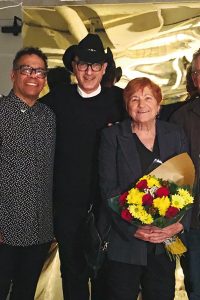Premee Mohamed: Post-Apocalyptic Possibilities

PREMEE MOHAMED is an Indo-Caribbean scientist and writer, born 1981 in Edmonton, Alberta, Canada. She attended the University of Edmonton, where she earned degrees in molecular genetics and land reclamation. She currently works as a reclamation and remediation policy specialist in Alberta.
Mohamed began publishing genre fiction in 2015 with “The Adventurer’s Wife” and has published more than 40 stories since, including novella The Apple-Tree Throne (2018). In 2021 she published three novellas: These Lifeless Things, Nebula Award finalist And What Can We Offer You Tonight, and The Annual Migration of Clouds. Two sequels to the latter, We Spoke Through the Mountain and The First Thousand Trees, are forthcoming. She recently sold her debut collection, No One Will Come Back for Us.
Her debut novel Beneath the Rising (2020) was a Crawford, British Fantasy, and Aurora Award finalist. It launched a trilogy that continues with A Broken Darkness (2021) and the forthcoming The Void Ascendant (2022).
Mohamed was a Capital City Press Featured Writer for 2019/2020 with the Edmonton Public Library, and has been a guest editor for novellas at Interstellar Flight Press and for short fiction at Apparition Lit. She is currently social media manager and assistant editor for SF podcast Escape Pod.
Excerpt from the interview:
“I was one of those kids who learned to read really early – my mom says I was around two. I don’t know if that can be believed, because that sounds almost too early for my eyes to focus, but that’s the story she tells. It’s true they didn’t read to me when I was a kid because I was reading to myself, and it’s true that I don’t remember a time when I couldn’t read. I would read whatever was around me. I was the kid who, on a car ride, would yell out all the signs, and read people’s T-shirts on the bus. I’m glad they put something on the back of the cereal box to read, or I would have lost my mind at breakfast. There were books at home, but there wasn’t a ton of what I would consider interesting books at the time. There were a lot of home repair manuals and cookbooks and a lot of non-fiction, but my parents didn’t read a lot of fiction. They prioritized what they considered to be sensible reading – they had this imbalance between fiction and non-fiction. What they didn’t mind, though, was taking me to the library as often as I wanted, and they didn’t care what I took out, provided there wasn’t a naked woman or a graphic murder on the cover. You could get away with a lot if it was a graphic-looking cover that didn’t have an illustration on it. I read everything I could get my hands on at the library – the school library, our public library, whatever.
“I started writing around the same time I started drawing and scribbling – age three or four. I don’t think my parents have any of that earlier stuff. I do remember my earliest completed work. That was around the time our childcare had fallen through for some reason, so for several months, my dad came and got me after school, and then I hung out with him at his office until six or something like that. What are you supposed to do with an eight year old in a government office? He would just sit me in an empty cubicle and give me a bunch of art supplies. I wrote a story about a cat who had had his tail stolen by pirates. One of his coworkers gave me a set of drafting markers that were super smelly, so I sat there coloring it and probably destroyed all my little brain cells. Maybe they needed the encouragement of the fumes. Then the coworker bound it for me, with spiral binding because they had one of those machines in the office, and I was so excited. I have no idea where it is now. I can’t remember how it ended, but I hope the cat got its tail back. It was fun, and it was satisfying. The rest of my writing was very much like that. I wanted to write something because I found it fun to do, and then I’d have something to read. Writing has always just been a hobby, and I use this analogy: it’s like those guys who have a vintage car in the garage, and they tinker with it and they tinker with it, and it’s just something they like to do. It’s fun to tinker.
“I enjoy that sense of escapism, when you just open the door and step into the story, and you’re in full control of everything, and people are doing what you want for once. Things are going along a path and you’re somewhere that isn’t just your boring real life, and you can just shut the door behind you, which is great.
“With the pantser-plotter dichotomy… it’s really more of a spectrum, because everybody does both, whether they realize it or not. I’m a natural pantser, which goes back to that tinkering thing. When I was in high school, I would write these novels that simply never ended. They’d probably be like 300,000 or 400,000 words long, with 50 characters. I’d drop several plots, and when I’d get near the end, I’d be like, ‘Oh my God, I literally left somebody in a cave. I hope he gets out!’ It was fun to just go in there and let the characters have adventures, exchange some snappy dialogue, and maybe encounter a monster or something. That’s very much what Beneath the Rising was, because I was just pantsing along – there was nothing I wanted to do with it. I did, at some point, want to get to the end of the story, but that was really it. Whatever else I was working on, I’d go back and open up the ‘Beneath’ file and move a paragraph around or something, and then close the file again. That approach doesn’t work super well after you are on the publishing treadmill, though, because there are deadlines, and pantsing for me takes a long time because it’s like I’m on a spiraling flight path towards the story instead of flying straight at it. Anyway, analogies are hard.
“I think that’s the difference, too, between people who want to write for a living and people who have to write for a living. If you have the privilege to say, ‘I’ll get you the novel when I get you the novel, but I don’t want a deadline,’ that suggests to me that you’re one of the big sellers of the world and you’re like Stephen King or somebody. I can’t do that at this stage in my career, but I had to teach myself to outline, because that did not come naturally to me. I liked finding out what happened next, and if it didn’t make any sense, then I’d have to go back and fix it. But the constant going back, going back, going back – it takes a long time.
“The story of Beneath the Rising is ‘a scientist solves the world’s energy problem and creates a bunch more problems.’ I stole that line blatantly from somebody I bumped into at Worldcon in 2019, because I love it – it’s so concise. It leaves out a bunch of details, but that’s basically what happens. I finished Beneath the Rising the year I graduated, 2002, so it was almost being written concurrently with the events that are happening chronologically in the novel. I love it when people are like, ‘Wow, this feels so authentic, they’re wearing Gap khakis and using Netscape Navigator,’ I’m like, ‘Excuse me! I used Netscape Navigator! This isn’t a period piece.’ You can get off my lawn! That was during my first degree, in molecular genetics. I worked in a combined hepatitis and cancer lab for a while, then went back to school for a different degree, also science – land reclamation, mostly soil science. I kept writing the whole time. I actually didn’t think about that novel very much because I was writing all sorts of other stuff in the meantime. I’d moved on to other stories and characters, a lot of which I never finished. I wasn’t writing for publication – I just wasn’t interested. Writing was my hobby. I don’t understand why anybody would be interested in my hobby. It’s like if I were doing cross-stitch or something, I wouldn’t invite people over to watch me cross-stitch. I thought publishing was a weird idea, and I didn’t want to be a writer, either. I’m not sure why that changed – I’m still asking myself that, honestly. I think a lot of writers don’t know why they do it, because we’re obviously, in a lot of cases, not doing it for the money. Without getting into details, I can say I am never quitting my day job. We’re not getting into it for the fame, either – the fame is stressful, and writers aren’t that famous anyway, for the most part. Low-level celebrity is terrible. Hypervisibility is not fun. Why are we doing this? We’re introverts. Or most of us are. I don’t know.
“I had a major health scare around the time that I decided to start trying to get published. That was shortly after a friend emailed me to say, ‘I just saw an open call for submissions for short stories, and this sounds like the thing you read, so maybe you should write a story for it.’ I said, ‘Maybe you should write a story for it!’ He didn’t, because this was a women-only call, for She Walks in Shadows, the anthology. I wrote a story for that, ‘The Adventurer’s Wife’, practically the first short story I’d written since high school, when I was being forced to write short stories, because it’s not my natural length and I find them very difficult. They bought it! So for a little while my submission-to-acceptance ratio was one. That did not last. It was validating, though. I was like, ‘Oh, that was easy!’
“I didn’t think about craft. That’s something that people who wanted to get published would think about, so I didn’t take any writing classes, or read any writing books, I just read a lot. I just wanted to make up my little stories. I’m a self-taught writer. It’s like I’m an architect looking at a house and going, ‘Oh, I could build that.’ That analogy’s not really accurate, because a piece of fiction doesn’tneed a utilitarian function like that. It literally is all appearances; it doesn’t have to be built to code, and people don’t have to live in it. Writing is one of those cases where, if you look at the house and you build something that looks like a house, you’re actually okay. It can’t collapse and squish anybody. Writing might be the only thing where you can actually do that, and none of us should really have imposter syndrome for that reason, because frankly, we’re all imposters.
Interview design by Stephen H. Segal.
Read the full interview in the April 2022 issue of Locus.
 While you are here, please take a moment to support Locus with a one-time or recurring donation. We rely on reader donations to keep the magazine and site going, and would like to keep the site paywall free, but WE NEED YOUR FINANCIAL SUPPORT to continue quality coverage of the science fiction and fantasy field.
While you are here, please take a moment to support Locus with a one-time or recurring donation. We rely on reader donations to keep the magazine and site going, and would like to keep the site paywall free, but WE NEED YOUR FINANCIAL SUPPORT to continue quality coverage of the science fiction and fantasy field.
©Locus Magazine. Copyrighted material may not be republished without permission of LSFF.







